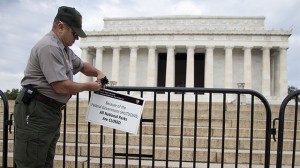
A National Park Service employee posts a sign on a barricade to close access to the Lincoln Memorial in Washington, Tuesday, Oct. 1, 2013. (AP Photo/Carolyn Kaster)
Much of the federal government has shut down and unlike the 1996 version, it may drag on and become a protracted affair.
Then, in two and a half weeks, the government will hit the debt ceiling, and the GOP’s tea party faction is preparing to make a last stand against Obamacare on that hill.
Confused by all this? Unsure how we got here? Wondering what happens to which public services? Wondering what might happen next? Here are some essential reads to help make sense of it all.
What happens now? Brad Plumer has a comprehensive guide to the government shutdown in the Washington Post.
How did we get here? In January, Speaker John Boehner (R-OH) said that he was through negotiating with President Obama and would return to “regular order.”
Meanwhile, Republicans had been lambasting the Democrat-controlled Senate for two years for failing to pass a budget. When the Senate did so, hard-right Republicans prevented Majority Leader Harry Reid (D-NV) from appointing conferees to reconcile the Senate budget with the House budget that had been authored by Paul Ryan (R-WI) — they blocked “regular order.” Eugene Robinson wrote about why they made that move in The Washington Post back in May. In The Los Angeles Times, Jon Healey noted that coming into this latest standoff, the Democrats were prepared to accept a budget pretty close to what House Republicans wanted last spring.
As such, Democrats felt that they were already meeting Republicans more than half way. But as our own Joshua Holland explained last month, Republicans were planning to use the budget process – and the looming debt ceiling – to wage war against what they saw as an almost existential threat to their ideology: Obamacare. This week, he argued that this is a rejection of longstanding norms of governance that have made the separation of powers work.
Civil War… On one level, this is certainly a partisan fight. But that obscures the central dynamic of this story: a civil war between factions of the Republican Party. Heidi Przybyla and Julie Hirschfeld Davis looked at this angle for Bloomberg. The New Yorker’s Ryan Lizza looked at the districts of the 80 House members who had signed a letter pushing for the defunding campaign, and found that they are completely insulated from the usual political incentives that drive legislators’ decision-making (that one is a must-read).
Time Magazine’s Zeke Miller wrote about the Heritage Action fund’s hand in pushing the tea party caucus to demand a shutdown. In The New York Times, Ashley Parker reported that the right wing was jubilant over the shutdown and sure of the righteousness of their cause. And The Nation’s John Nichols considered why moderate Republicans are unwilling to push back against the conservative wing.
The Politics… Democrats, independents and Republicans who don’t identify as tea partiers all oppose using the budget or the debt ceiling to extract partisan concessions by decent margins. As the National Journal noted, tea partiers alone are overwhelmingly in favor of shutting down the government.
Noam Sheiber at The New Republic thinks the American people are going to punish the Republicans much harder than they did in the shutdowns of the 1990s. At the Daily Beast, Jamelle Bouie thinks it won’t be the hard-right members who take the blame, but rather more mainstream Republicans. Meanwhile, the Heritage Foundation is telling conservatives that Republicans won’t be hurt at all by shutting down the government.
From budget fight to debt ceiling folly… Moyers & Company’s own John Light offered up a history of debt ceiling politics. Nobody really knows what would happen if we were to breach the debt ceiling. But Slate’s Matt Yglesias offers some scary predictions, as does The Atlantic’s Mathew O’Brien, who says it could result in a “historic calamity.”
Ezra Klein hoped that a shutdown would create a backlash that might make a debt ceiling breach less likely. But Molly Ball writes at The Atlantic that the same group pushing the shutdown strategy has every reason to try again with the debt ceiling. And as The Hill reported this week, it’s unclear whether any debt-limit hike can garner the support of enough Republicans to pass the House without Democratic votes.
Another must-read: Jonathan Chait argues in New York Magazine that this debt ceiling battle will be the most important fight of Obama’s presidency, and one that he must win in order to preserve our constitutional form of government.
Work-arounds? Last December, as we faced the first “fiscal cliff,” The Daily Beast’s Matt Zeitlin explained how a trillion-dollar platinum coin could avert the crisis, if the administration decided to play hardball. Writing in Slate, Eric Posner said that doing so would lead to impeachment.
In 2011, Adam Liptak reported for The New York Times that Obama might simply invoke a rarely-discussed provision of the 14th Amendment to get around the limit. And this week, also in The Times, Henry Aaron explained that breaching the debt limit would require Obama to break one of two laws — he urged the administration to choose the one that wouldn’t result in economic chaos.
This is a developing story, and we’ll continue to update this post as more information becomes available.

